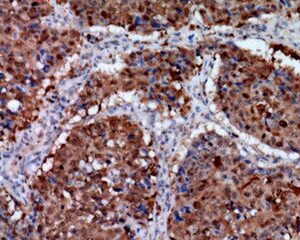Integrins are heterodimeric cell surface receptors composed of noncovalently associated transmembrane α and β subunits that play a pivotal role in cell adhesion and migration, as well as in growth and survival. Integrins not only transmit signals to cells in response to the extracellular environment (outside-in signaling), but also sense intracellular cues to alter their interaction with the extracellular environment (inside-out signaling). Integrin α1 (CD49a, VLA-1, ITGA1) pairs with integrin β1 to form an α1β1 dimer on the cell surface. This integrin dimer plays important roles in colorectal cancer and pancreatic cancer cell proliferation, migration, and metastasis. The cytoplasmic tail of integrin α1 activates ERK and FAK/Src signaling to promote these biological processes. In immune systems, integrin α1 expression defines a tissue-resident cytotoxic T cell population contributing to both cancer immunity and vitiligo, an autoimmune disease.
Clone
Polyclonal
Isotype
IgG
Host species
Rabbit
Species Reactivity
Human
Cellular Localization
membrane
Positive Control
prostate, placenta , stomach
Applications
IHC
Intended Use
Research Use Only

